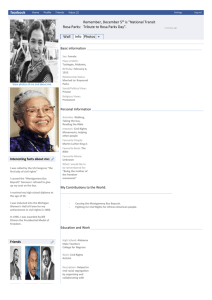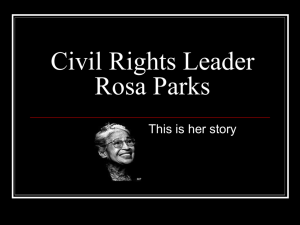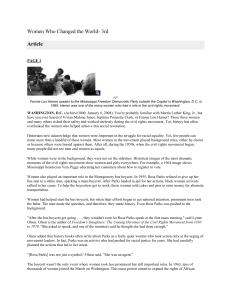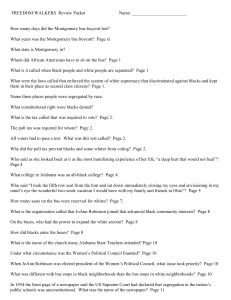Rosa Parks Speech: 60th Anniversary & Civil Rights Movement
advertisement
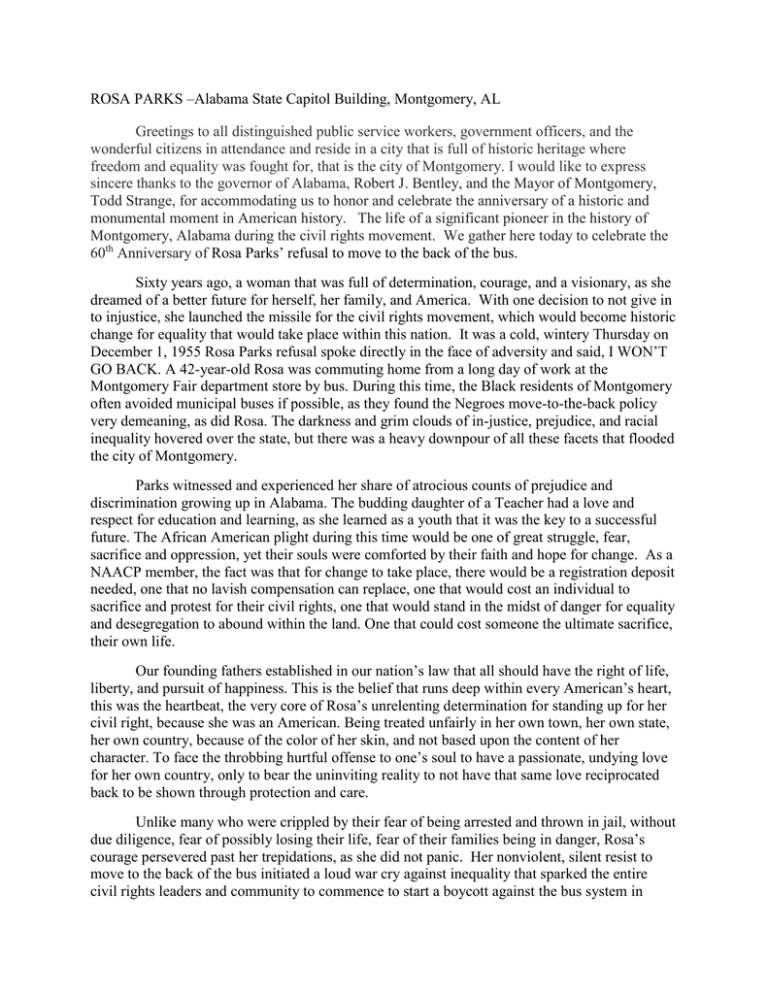
ROSA PARKS –Alabama State Capitol Building, Montgomery, AL Greetings to all distinguished public service workers, government officers, and the wonderful citizens in attendance and reside in a city that is full of historic heritage where freedom and equality was fought for, that is the city of Montgomery. I would like to express sincere thanks to the governor of Alabama, Robert J. Bentley, and the Mayor of Montgomery, Todd Strange, for accommodating us to honor and celebrate the anniversary of a historic and monumental moment in American history. The life of a significant pioneer in the history of Montgomery, Alabama during the civil rights movement. We gather here today to celebrate the 60th Anniversary of Rosa Parks’ refusal to move to the back of the bus. Sixty years ago, a woman that was full of determination, courage, and a visionary, as she dreamed of a better future for herself, her family, and America. With one decision to not give in to injustice, she launched the missile for the civil rights movement, which would become historic change for equality that would take place within this nation. It was a cold, wintery Thursday on December 1, 1955 Rosa Parks refusal spoke directly in the face of adversity and said, I WON’T GO BACK. A 42-year-old Rosa was commuting home from a long day of work at the Montgomery Fair department store by bus. During this time, the Black residents of Montgomery often avoided municipal buses if possible, as they found the Negroes move-to-the-back policy very demeaning, as did Rosa. The darkness and grim clouds of in-justice, prejudice, and racial inequality hovered over the state, but there was a heavy downpour of all these facets that flooded the city of Montgomery. Parks witnessed and experienced her share of atrocious counts of prejudice and discrimination growing up in Alabama. The budding daughter of a Teacher had a love and respect for education and learning, as she learned as a youth that it was the key to a successful future. The African American plight during this time would be one of great struggle, fear, sacrifice and oppression, yet their souls were comforted by their faith and hope for change. As a NAACP member, the fact was that for change to take place, there would be a registration deposit needed, one that no lavish compensation can replace, one that would cost an individual to sacrifice and protest for their civil rights, one that would stand in the midst of danger for equality and desegregation to abound within the land. One that could cost someone the ultimate sacrifice, their own life. Our founding fathers established in our nation’s law that all should have the right of life, liberty, and pursuit of happiness. This is the belief that runs deep within every American’s heart, this was the heartbeat, the very core of Rosa’s unrelenting determination for standing up for her civil right, because she was an American. Being treated unfairly in her own town, her own state, her own country, because of the color of her skin, and not based upon the content of her character. To face the throbbing hurtful offense to one’s soul to have a passionate, undying love for her own country, only to bear the uninviting reality to not have that same love reciprocated back to be shown through protection and care. Unlike many who were crippled by their fear of being arrested and thrown in jail, without due diligence, fear of possibly losing their life, fear of their families being in danger, Rosa’s courage persevered past her trepidations, as she did not panic. Her nonviolent, silent resist to move to the back of the bus initiated a loud war cry against inequality that sparked the entire civil rights leaders and community to commence to start a boycott against the bus system in Alabama. She was not the first to refuse to give up her seat to a white person, but it was the first time that it happened to someone that everyone knew, as she was apart of the NAACP organization. Despite her notoriety, it was her courage and non-satisfaction that stood beside her while being arrested. Her vision for freedom and a life without living in fear was worth the protest for equality for her people. The future of America that she envisioned, is what we live today amongst one another in peace, where justice can truly be for all. The stench of racism permeated throughout the atmosphere of Montgomery, and filled in thick within the confines of the bus that day. It was the raring necessity for change that was Rosa’s filter to breathe a new caliber of oxygen, for she knew there was going to be a downpour. A downpour that would cleanse the atmosphere of its racist pollutants in result from her resilience as it whispered with a loud outcry, I WON’T GO BACK. The legendary, Dr. Martin Luther King, Jr. learned of Rosa’s arrest, and urged to call a rally meeting at his church. A huge crowd of people gathered together as their necessity for change was urgent and their non-satisfaction of prejudice and inequality within Montgomery could no longer be tolerated. Although, people were inspired by Rosa’s courageous action, they were afraid. Dr. King influenced and encouraged them to believe that with the support of each and every person, there can be change. There is something that they can do. They decided despite the hardships they would face, without their means for transportation, they would boycott the bus systems in Alabama. The result of those who participated in the boycott would cause the city to lose a huge amount of revenue if they lost a great amount of transporters. On the morning of December 5th, not everyone, but many people of color, including supporters of other racial backgrounds, refused to ride the bus. They walked. They rode mules. Those few people with cars acted as a shuttle service, taking others to work and wherever they needed to go. Each participant in the boycott all had one common belief, that they WON’T GO BACK to they way things used to be. Violence had ensued throughout the boycotting, but it didn’t deter the boycotters or their leaders. Drama in Montgomery continued to gain attention from the national and international press. Though they faced difficulties and some grew weary, at the end of the 381 days of the boycott, change finally approached and knocked at inequality’s door. On November 13, 1956, the United States Supreme Court ruled that Alabama's laws requiring segregation on buses, requiring persons of color to ride in the back of the bus, and to give up their seat in the colored section to a white person if the bus was crowded, were illegal. At first, the Montgomery city government ignored the Supreme Court ruling. About a month later, federal orders were given to the city and bus company officials to follow national law. Sixty years later, we commemorate this historic moment in time to reflect upon “the mother of the civil rights movement”, a woman who was courageous, determined, and a visionary. Her courage stands tall as inspiration to all Americans, as we still face injustices and prejudices against races and gender. We must support and stand together when our civil liberties are taken away from any one of us. We must decide to say something, do something, for where there is no justice for one, then it resonates that truly, there is no justice for all. Rosa Parks refusal to move to the back of the bus spoke volumes. Her exemplary bravery showed us, that she would not go back! Each one of us must proclaim in our hearts, though we might face adversity, I WON’T GO BACK! I WON’T GO BACK until our fellow brothers and sisters are treated fairly. I WON’T GO BACK until we all have equal opportunity, and I WON’T GO BACK until there is true equality for all!! God Bless you all, and God Bless America!!
